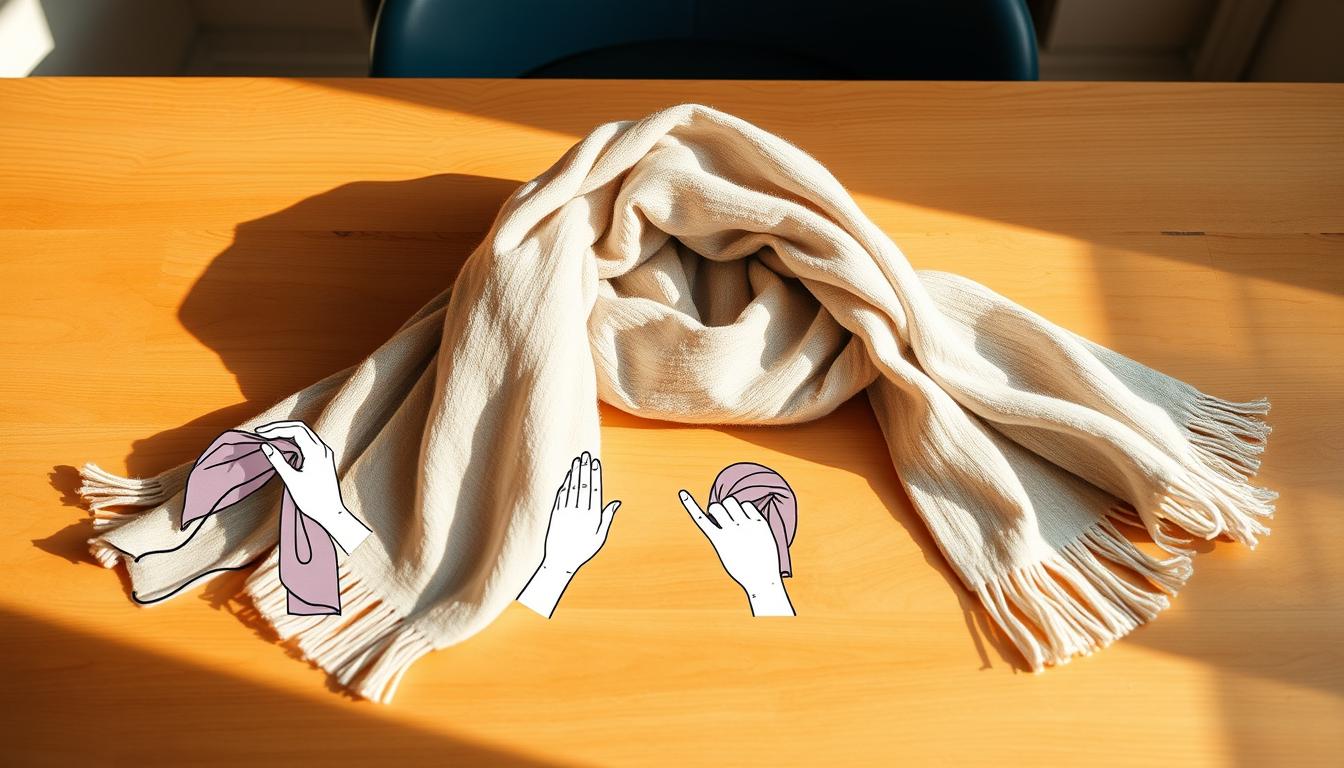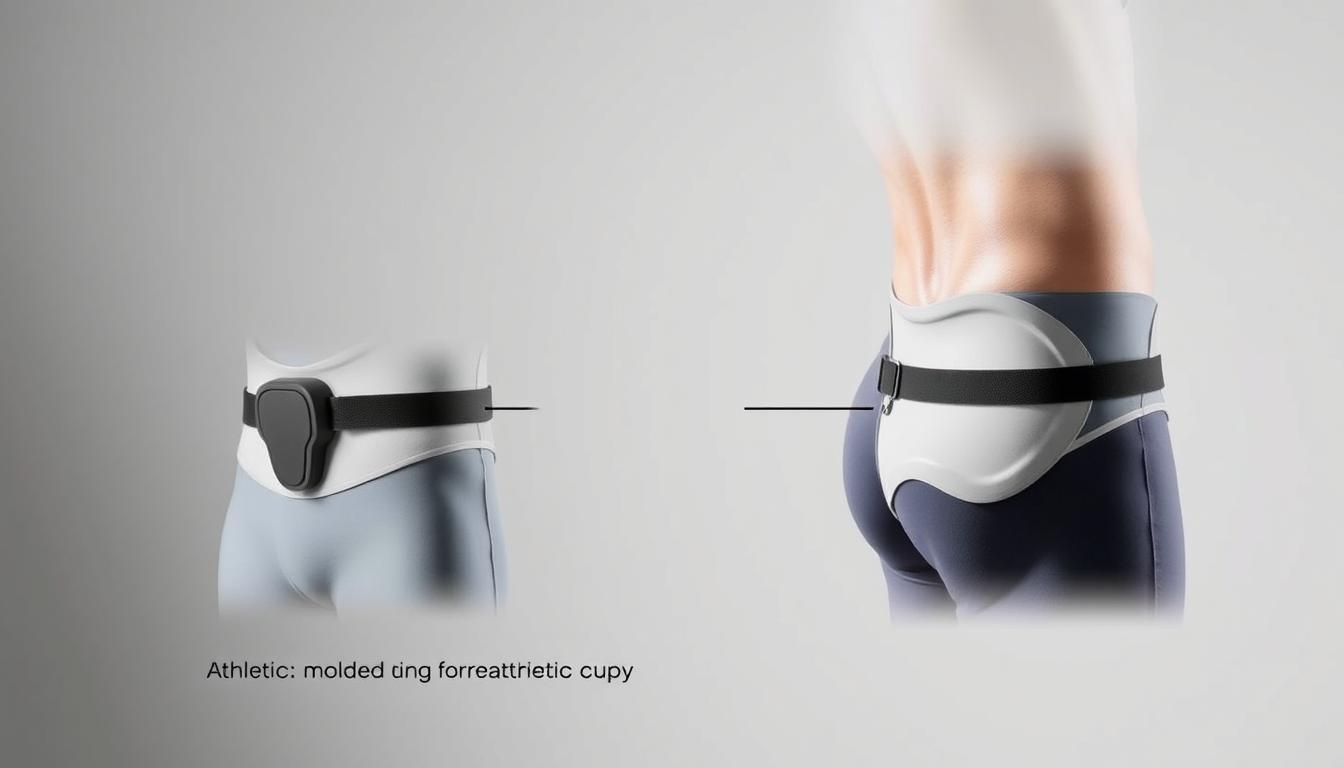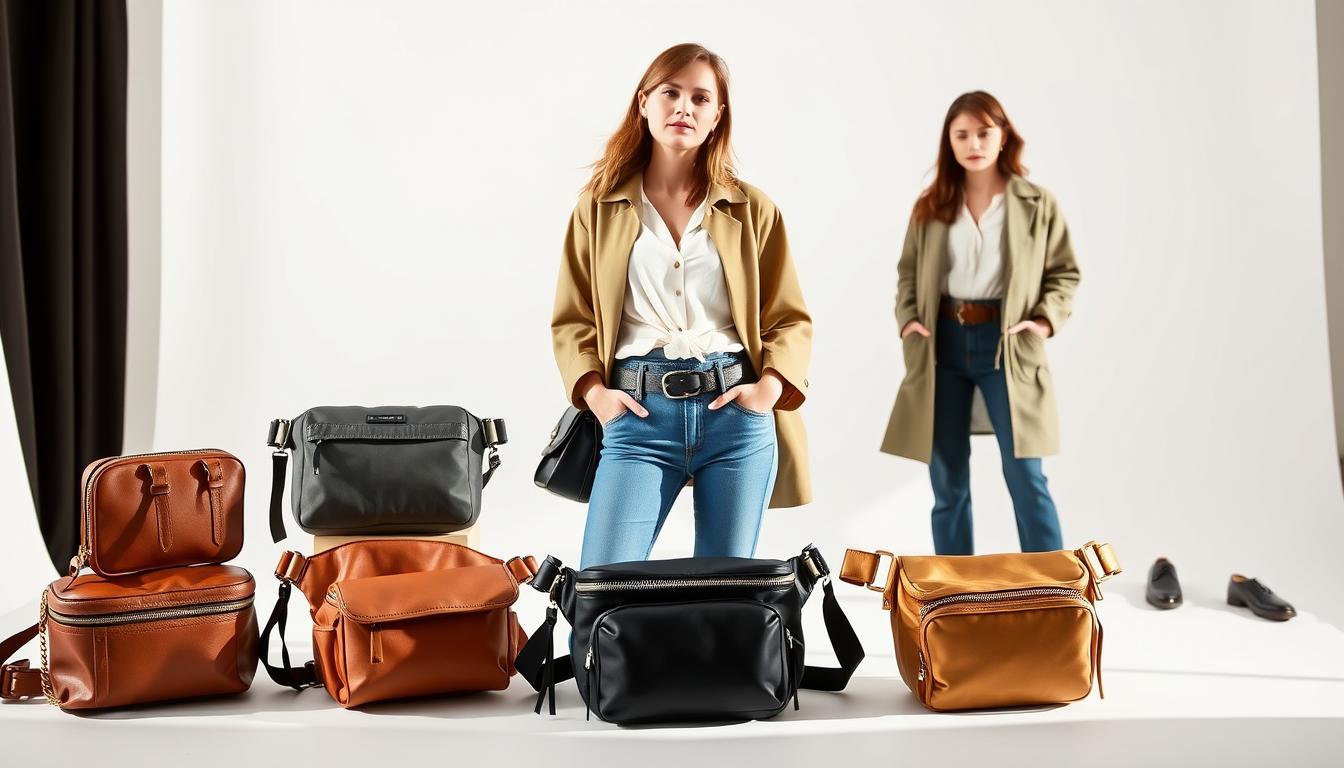Adding a perfectly tied scarf to your outfit can make it stand out. Learning to tie a scarf is a skill that brings elegance and a personal touch to any look. It’s perfect for keeping warm in winter or adding a stylish touch to summer outfits.
A scarf tying tutorial is more than just wrapping fabric around your neck. It’s about showing off your unique style through your choices. Whether you want to look professional or bohemian, there’s a scarf style for you. It’s easy to learn these techniques, making them great for everyone.
The key to a great scarf look is knowing the basics and trying out different styles. Some styles suit silk scarves better, while others look good with wool or cotton. By trying different ways, you can find the perfect scarf for your body, outfit, and style.
Key Takeaways
- Scarves are versatile accessories that can transform any outfit
- Learning multiple tying techniques enhances your styling options
- Different scarf materials require unique styling approaches
- Practice is key to mastering elegant scarf arrangements
- Scarf styling can adapt to various occasions and personal preferences
Essential Scarf Materials and Types
Choosing the right scarf material is key to mastering different ways to tie a scarf. It affects both style and function. This makes it a vital part of perfecting scarf tying techniques.
When looking at scarf options, you’ll find many fabrics with unique qualities. Knowing these materials helps you create stunning looks for any event.
Silk Scarves and Their Characteristics
Silk scarves add elegance and sophistication to your wardrobe. These luxurious accessories offer:
- Smooth, lightweight texture
- Excellent draping qualities
- Versatile for both casual and formal settings
- Delicate handling required
Wool and Cotton Scarf Options
Practical fabrics like wool and cotton provide warmth and durability. They are great for various scarf tying techniques. Wool and cotton scarves offer different benefits:
- Wool: Provides exceptional warmth
- Cotton: Breathable and easy to maintain
- Great for layering in different seasons
Choosing the Right Length and Width
Scarf dimensions greatly affect your styling options. Here are some guidelines for choosing the perfect scarf:
- Narrow scarves: Ideal for delicate knots
- Wide scarves: Perfect for dramatic draping
- Standard lengths range from 50-72 inches
Trying out different materials and sizes will help you find the most flattering ways to tie a scarf for your style.
Understanding Basic Scarf Terminology
Starting your scarf knotting guide journey means learning some key fashion words. Our scarf terminology guide will make you go from beginner to pro accessorizer fast.
Now, let’s look at the main terms every fashion lover should know for scarves:
- Drape: The way a scarf falls and hangs around your neck or body
- Loop: A circular arrangement of fabric creating volume and style
- Knot: A specific technique of twisting or tying the scarf to create structure
- Width: The horizontal measurement of a scarf, affecting its versatility
- Length: The vertical measurement determining styling possibilities
Knowing these terms is key to mastering your scarf knotting guide. Each word is a major technique for turning simple fabric into a stunning fashion piece.
| Term | Definition | Styling Impact |
|---|---|---|
| Drape | Fabric’s fluid movement | Creates elegant, relaxed looks |
| Loop | Circular fabric arrangement | Adds volume and visual interest |
| Knot | Fabric twisting technique | Provides structure and definition |
With these basic terms, you’re set to dive into more advanced scarf styling with confidence and style.
How to Tie a Scarf: Fundamental Techniques
Learning to tie a scarf opens up a world of stylish possibilities. Our step-by-step guide will turn you from a beginner to a confident accessorizer quickly.
Scarves are versatile accessories that can make any outfit better. Before we dive into specific techniques, it’s important to understand the basics.
Proper Scarf Handling
Proper care for your scarves keeps them looking great. Here are some key tips:
- Always check fabric care labels
- Store scarves flat or rolled, avoiding direct sunlight
- Use padded hangers for delicate materials
- Steam or gently iron to remove wrinkles
Basic Folding Methods
Folding is the base of most scarf styling techniques. Different folds create unique looks:
| Fold Type | Best For | Difficulty Level |
|---|---|---|
| Half Fold | Classic, Simple Styles | Beginner |
| Triangle Fold | Dramatic Draping | Intermediate |
| Diagonal Fold | Asymmetric Looks | Advanced |
Essential Knot Foundations
Knots can turn simple scarves into statement pieces. Start with these basic knots for your scarf tying step by step tutorial:
- Simple Loop: Most versatile knot
- Overhand Knot: Quick and easy
- Pretzel Knot: More complex, dramatic style
Practice these techniques to build confidence in your scarf styling skills. Remember, every great accessory moment starts with understanding the basics.
The Classic European Loop Method
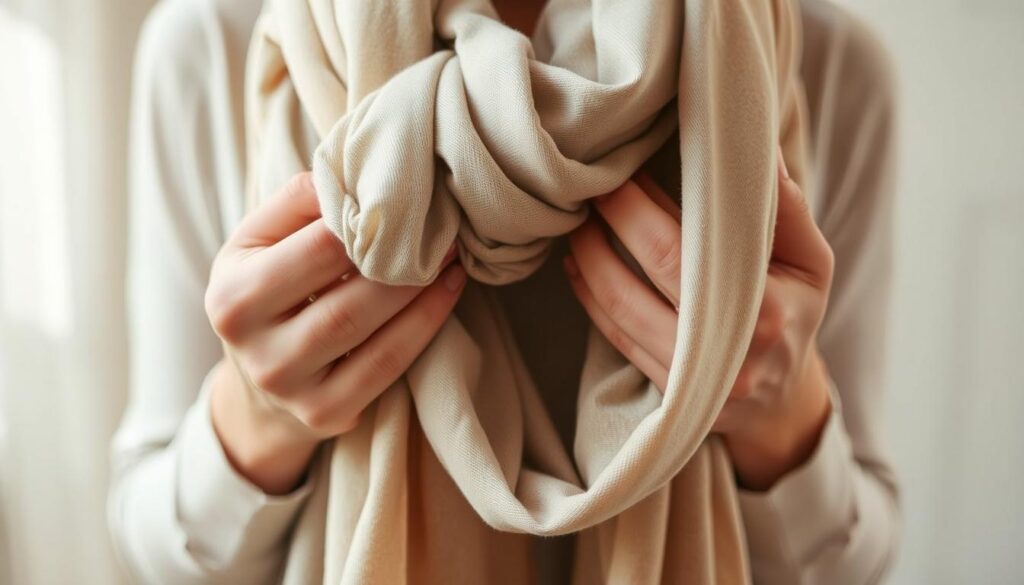
Take your accessory game to the next level with a stylish scarf knot that exudes European elegance. The Classic European Loop Method turns a simple scarf into a standout piece with just a little effort.
This scarf tying method is perfect for all sorts of fabrics and gives you a polished look in no time. It’s great for any occasion, from a business meeting to a casual brunch. It easily fits into any outfit.
- Suitable for silk, wool, and cotton scarves
- Takes less than 30 seconds to execute
- Works with scarves of various lengths
To make the perfect European Loop, begin by folding your scarf in half. Place the folded scarf around your neck, making sure both ends are even. Then, pass the loose ends through the folded loop to create a neat and stylish knot.
| Scarf Type | Difficulty Level | Style Impact |
|---|---|---|
| Silk Scarves | Easy | High Elegance |
| Wool Scarves | Very Easy | Casual Chic |
| Cotton Scarves | Easy | Versatile |
Pro tip: Adjust the loop’s tightness to match your outfit and comfort level. A looser loop is perfect for casual settings, while a tighter one adds a touch of sophistication to formal looks.
Creating the Perfect Infinity Loop
The infinity loop scarf tying technique is a game-changer. It turns a simple scarf into a bold statement. Our creative ideas will guide you in mastering this versatile style. It suits many fabrics and outfits.
Infinity loops are great for those who want stylish yet practical scarves. They create a continuous look that enhances any outfit.
Single Loop Technique
Learn the basic single loop with these steps:
- Fold your scarf in half lengthwise
- Drape around your neck with loop on one side
- Pull the hanging ends through the loop
- Adjust for desired tightness and volume
Double Loop Variation
Try the double loop method for a more sophisticated look:
- Start with a longer scarf for best results
- Create two distinct loops instead of one
- Twist the fabric between loops for added texture
- Secure loops at different heights for visual interest
Securing Your Infinity Style
Keep your infinity loop looking perfect all day with these tips:
| Tip | Description |
|---|---|
| Fabric Weight | Choose scarves with slight stretch for better hold |
| Pin Placement | Use small safety pins hidden underneath for extra stability |
| Layering Technique | Wear under coat collar to prevent shifting |
Pro tip: Practice makes perfect with these creative scarf tying techniques!
Mastering the French Knot Style
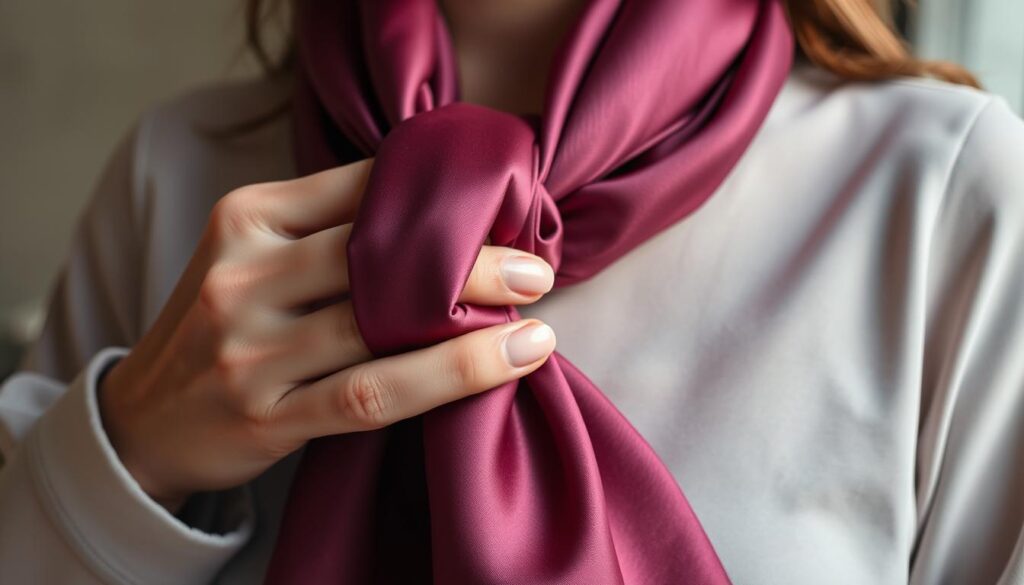
Take your accessories to the next level with the French knot. This scarf tying tutorial turns any outfit into a showstopper. It adds a touch of Parisian elegance, making your look polished and stylish.
Learning to tie stylish scarf knots takes time and effort. The French knot is a standout for its sophistication. It looks great with many scarf types and sizes.
- Perfect for silk scarves
- Ideal for professional and casual settings
- Requires minimal adjustment throughout the day
To tie the perfect French knot, follow these steps:
- Fold your scarf in half lengthwise
- Drape the scarf around your neck
- Pull the loose ends through the folded loop
- Adjust for a smooth, elegant finish
Practice in front of a mirror to get that Parisian look. The trick is to be relaxed yet focused on the knot.
| Scarf Type | Best for French Knot | Difficulty Level |
|---|---|---|
| Silk | Excellent | Easy |
| Wool | Good | Medium |
| Cotton | Moderate | Easy |
Pro tip: Pick scarves that are a bit heavy but flow well. Light ones might slip, while heavier ones keep their shape better.
Stylish Draping Techniques for Different Occasions
Scarves are the ultimate versatile accessory. They can transform any outfit with just a few creative twists. We’ll explore different ways to tie a scarf for every moment of your day.
Mastering creative scarf tying ideas means adapting your style to various settings. Your scarf can be more than just a fashion statement. It’s a functional piece that adds personality to your ensemble.
Casual Day Looks
For everyday wear, comfort meets style with relaxed draping techniques. Try these effortless approaches:
- The Classic Loop: Fold your scarf in half and pull the loose ends through the loop
- Lazy Wrap: Simply drape the scarf around your neck with minimal adjustment
- Bohemian Knot: Create a loose side knot for a carefree, relaxed vibe
Evening Wear Arrangements
Elevate your evening look with more sophisticated scarf styling methods:
- Elegant Shoulder Drape: Let the scarf cascade gracefully over one shoulder
- Twisted Neck Wrap: Create intriguing twists for a glamorous effect
- Belted Silk Styling: Use a thin belt to cinch a silk scarf at the waist
Professional Setting Styles
Maintain a polished appearance with refined scarf techniques that complement work attire:
| Style | Description | Best For |
|---|---|---|
| Neat Ascot | Folded precisely under the collar | Corporate meetings |
| Subtle Loop | Minimalist single loop at the neck | Client presentations |
| Professional Knot | Tight, controlled knot near the neck | Executive settings |
By experimenting with these different ways to tie a scarf, you’ll unlock endless styling possibilities. These express your unique personality across every occasion.
Square Scarf Tying Methods
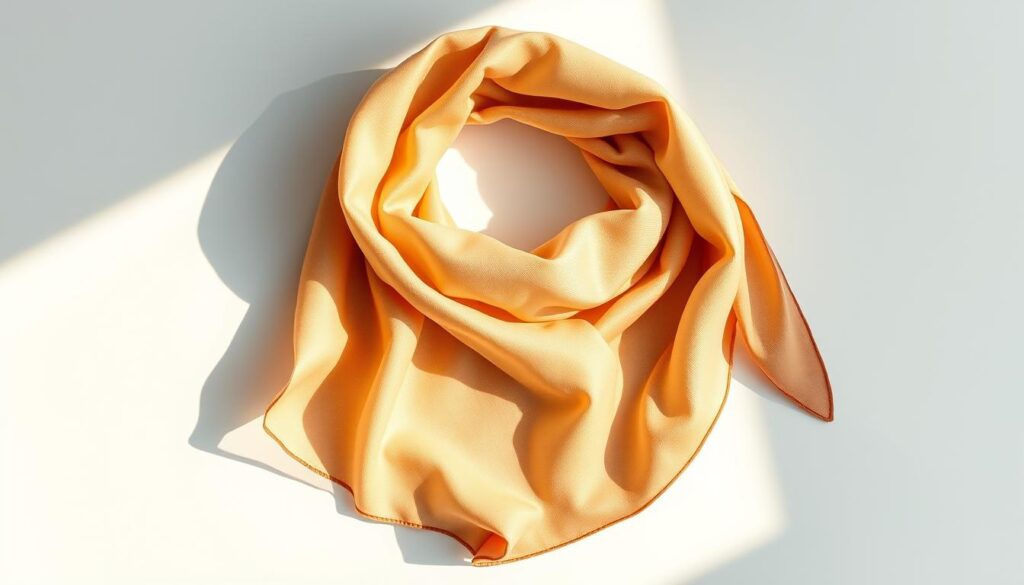
Square scarves are great for adding style to any outfit. With a few easy steps, you can turn them into eye-catching accessories. These stylish squares can make any look stand out.
Learning to style square scarves is easy. We’ll show you some popular and elegant ways to wear them:
- Classic Triangle Fold: Perfect for creating a sophisticated neck accent
- Headscarf Style: Ideal for adding a vintage touch to your look
- Bag Accessory Wrap: Instantly elevate your handbag’s appearance
- Neck Bandana Method: Create a chic, relaxed statement
Here are some creative square scarf tying techniques to boost your style:
| Technique | Difficulty Level | Best Occasion |
|---|---|---|
| Triangle Fold Neck Wrap | Beginner | Casual Daytime |
| Headscarf Knot | Intermediate | Beach or Summer Event |
| Bag Accent Wrap | Easy | Professional Setting |
For perfect scarf tying, start with a clean, smooth scarf. Silk and lightweight cotton are best for elegant looks.
With these easy methods, your square scarves will become fashion statements. They’ll add style to any outfit and match your personal taste.
Long Scarf Styling Techniques
Long scarves can make any outfit stand out. Our scarf knotting guide will show you how to use them to their fullest. Whether you want to add flair or make a bold statement, learning to tie a scarf can take your style to the next level.
Let’s dive into three amazing techniques to refresh your long scarves:
Waterfall Drape Method
The waterfall drape gives a sleek, flowing look. Start by folding your scarf in half lengthwise. Then, drape it over your shoulders, letting one side fall longer than the other. This creates a beautiful, flowing effect.
- Perfect for adding elegance to blazers and coats
- Works with silk, wool, and lightweight materials
- Creates a soft, romantic silhouette
Braided Scarf Technique
Turn your long scarf into a textured piece with braiding. This method is best for thicker scarves. Begin by folding the scarf into thirds lengthwise, then braid it loosely.
- Fold scarf into three equal sections
- Create a loose three-strand braid
- Secure with a small pin if needed
Belt Style Arrangement
Scarves aren’t just for necks. Our guide shows how to make a scarf into a chic belt. Fold the scarf into a thin strip and pass it through belt loops or wrap it around your waist.
| Scarf Type | Best for | Styling Tip |
|---|---|---|
| Silk Scarf | Delicate Belting | Use for lightweight, dressy looks |
| Wool Scarf | Winter Layering | Create structured waist definition |
| Cotton Scarf | Casual Outfits | Perfect for bohemian-inspired styles |
Pro tip: Try different folds to find the best look for your body and style.
Season-Specific Scarf Tying Ideas
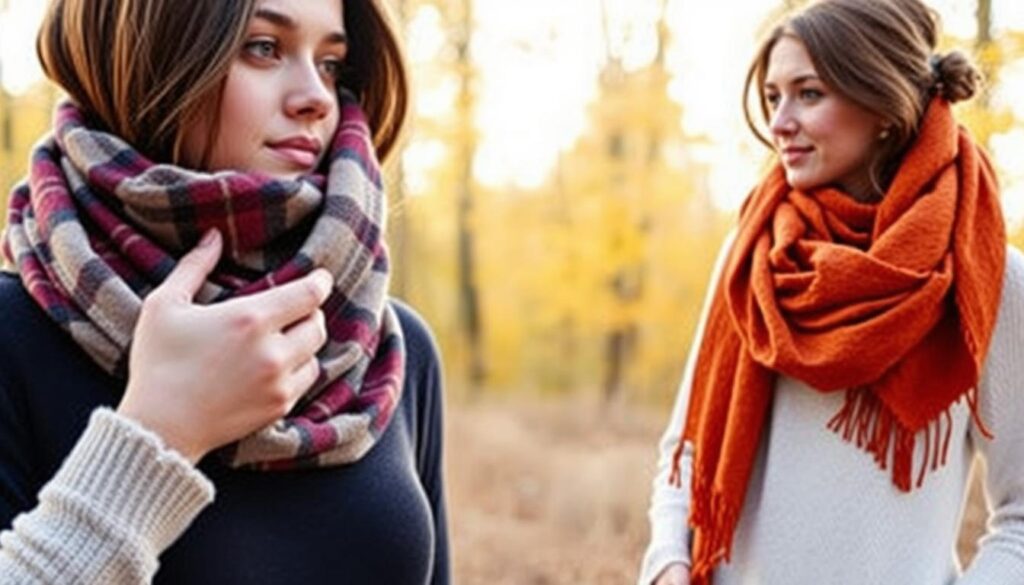
Scarves are perfect for every season. They can change any outfit. Our scarf tying ideas will keep you stylish and comfy all year.
Let’s look at how to tie a scarf for each season:
- Winter Warmth: Layer thick wool scarves with the European loop method for warmth and style
- Spring Freshness: Use lightweight silk scarves in bright prints, tied loosely around the neck
- Summer Elegance: Create delicate knots with thin cotton scarves as statement accessories
- Autumn Layers: Try draped techniques that match your fall clothes
Every season is a chance to show off your style with scarves. From thick winter wraps to light summer loops, your scarf can enhance any look.
Pro tip: Pick scarves that fit the season’s fabric and color. Light, airy materials are best in warm weather. Thicker, warmer fabrics are better in cold months.
With these ideas, your scarf collection will always be in style. It can be a fashion statement all year, fitting every climate and event.
Troubleshooting Common Scarf Tying Mistakes
Scarf styling can be tricky, even for fashion enthusiasts. Our detailed scarf tying tutorial will help you tackle common challenges. It will also improve your accessorizing skills. Every scarf tying step by step tutorial needs to know about possible problems and how to fix them.
Fashion emergencies can happen, but with the right techniques, you can turn them into stylish statements. Let’s look at the most common scarf styling problems and their elegant solutions.
Navigating Fabric Bulk and Bunching
Bulky scarves can make a sleek outfit messy. To avoid this:
- Choose lightweight fabrics for layered looks
- Use strategic folding techniques
- Practice smooth, controlled wrapping methods
Solving Uneven Scarf Ends
Symmetry is key in scarf styling. Pro tip: Adjust your scarf by gently pulling and evening out the fabric edges before finalizing your look.
| Issue | Solution |
|---|---|
| Uneven Length | Fold and adjust before tying |
| Twisted Fabric | Smooth out with gentle hand movements |
Preventing Scarf Slippage
Keep your scarf perfectly positioned with these expert techniques:
- Use hidden safety pins for secure placement
- Select scarves with textured fabrics
- Learn strategic knot techniques
By mastering these troubleshooting techniques, you’ll confidently rock any scarf style with professional finesse.
Advanced Scarf Knotting Techniques
Learning advanced scarf knots can take your style to the next level. These techniques turn a simple scarf into a fashion statement. Let’s dive into some advanced stylish scarf knots that will change how you dress.
Stylists suggest several complex knotting methods to show off your creativity:
- Fake Knot: Looks hard but is easy to do
- Tieneck Knot: Adds a touch of drama to your outfits
- Rosette Style: Makes a flower-like design around your neck
When trying these advanced knots, be patient. Choose scarves with different textures and lengths to try out various styles. Silk scarves are great for delicate knots, while wool is better for more detailed designs.
Each knot needs precision and practice. Watch tutorial videos and practice in front of a mirror to get it right. It’s not just about tying a scarf. It’s about making it a personal fashion statement that shows off your style.
Pro tip: Move smoothly and confidently. The best scarf knots seem easy but take skill.
Accessorizing Your Scarf Style
There’s more to scarves than just wearing them around your neck. Creative ways to tie a scarf can turn a simple accessory into a bold statement. We’ll show you how to match your scarf with the right jewelry and create amazing outfits.
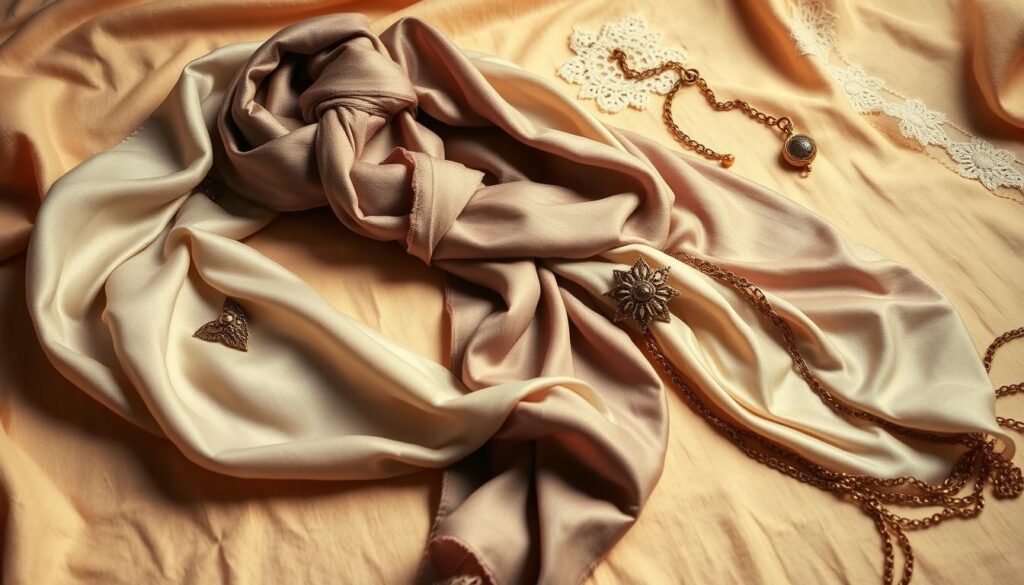
Choosing the right accessories can make your scarf look even more special. Here are some key tips to help you master scarf styling.
Jewelry Pairings that Shine
When picking jewelry for your scarf, keep these tips in mind:
- Delicate pendant necklaces look great with loose, flowing scarves
- Statement earrings can balance simple scarf styles
- Stay away from big necklaces that might clash with detailed scarf knots
Outfit Coordination Strategies
| Scarf Style | Recommended Outfit | Best Occasion |
|---|---|---|
| Infinity Loop | Fitted blazer, slim pants | Professional setting |
| French Knot | Silk blouse, tailored skirt | Evening event |
| Casual Drape | Jeans, sweater | Weekend outing |
Remember, your scarf is a blank canvas for self-expression. The right accessories can take even the simplest outfit to the next level.
Maintaining and Storing Your Scarves
Keeping your scarf collection in top shape is key. Our scarf tying techniques go beyond just looking good. They also include how to care for your scarves so they stay beautiful for a long time.
Every scarf is different, and they need special care. Silk scarves are delicate and need gentle handling. Wool and cotton scarves can handle more cleaning. Knowing how to care for each type keeps your scarves looking great.
- Clean silk scarves with specialized dry cleaning solutions
- Hand wash wool scarves in lukewarm water
- Use mild detergents specific to fabric type
- Avoid direct sunlight during drying
How you store your scarves is also important. To keep them looking good, they should be wrinkle-free and well-kept.
| Fabric Type | Storage Method | Recommended Temperature |
|---|---|---|
| Silk | Flat, padded hangers | Cool, dry environment |
| Wool | Folded in breathable containers | Room temperature |
| Cotton | Hanging or rolled storage | Moderate humidity |
Get protective bags or special scarf hangers to avoid damage. Rotate your collection to make sure each scarf gets worn evenly. This way, they stay beautiful for a long time.
Conclusion
We’ve shown you how to tie a scarf in a detailed tutorial. It’s not just about making knots. It’s about showing off your style with versatile accessories.
Every technique we’ve covered helps you feel more confident in your fashion choices. You can now add elegance to any outfit with European loops or keep it casual with draping methods. Remember, getting better at scarf styling takes practice and trying new things.
Your clothes are like a canvas, and scarves are the colors that make your look pop. Whether you’re going to a meeting or a brunch, you’re ready. You’ve got the skills to look great in any situation.
Keep exploring the world of fashion with scarves. Let each style show who you are. The key to fashion is feeling confident and comfortable in what you wear. Now that you know how to tie a scarf, show off your unique style.

